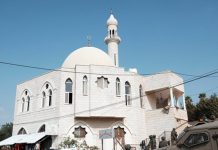Italian ministers have called a six-month state of emergency in response to a rise in migrant numbers crossing the Mediterranean from North Africa.
The decision frees up €5m (£4.4m) in funds and coincides with the arrival of 3,000 migrants in three days.
A number of boats have landed on the Italian island of Lampedusa and the coastguard has rescued some 2,000 people since Friday.
The UN has recorded the highest number of migrant deaths since 2017.
Its migration body said 441 deaths had been recorded in the Central Mediterranean in the first three months of 2023. It warned that delays in state-led rescues saw at least 127 people dying, while in another deadly incident there had been a complete lack of response.
In the latest sinking, at least 10 people from sub-Saharan Africa drowned off the Tunisian coast, according to the national guard. Dozens more were rescued after the accident on Tuesday off the port city of Sfax.
Tunisia has become the biggest point of departure for migrant boats in recent months and another four deaths were reported at the weekend off Sfax, some 185km (115 miles) away from Lampedusa.
Tunisia is in the grip of a financial crisis and the sharp rise in sea crossings came after President Kais Saied accused sub-Saharan migrants of causing a crime wave, prompting UN accusations of hate speech.
Migrant arrivals to Italy have risen sharply compared with the same period last year, despite efforts by Italy’s right-wing coalition government to clamp down on irregular migration. A fishing boat carrying 700 rescued migrants was due to arrive in port in Sicily on Wednesday afternoon.
Sea and Civil Protection Minister Nello Musumeci spoke of a 300% increase in migrant flows and said it was an “absolute emergency” that had put Italy’s infrastructure at risk. “We are talking about a phenomenon never seen in the past. The islands alone cannot deal with this state of emergency,”
The state of emergency would not solve the problem, the minister stressed. It required a responsible intervention by the European Union.
Source: bbc.com









